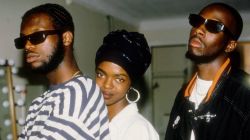Talib Kweli discusses taking control of his financial destiny thorugh quitting major labels in an essay published Tuesday (January 6) by Medium.com.
“For years I coasted on my ability to perform on stage or get a new deal when money got low, always trusting lawyers, managers, accountants and label reps to have my best interest in mind,” Talib Kweli writes in his essay. “ Making the initial investment for Gutter Rainbows myself while simultaneously removing several hands from the pot allowed me to increase my profit exponentially and to receive it almost instantly. Gutter Rainbows is still not one of my most famous albums, but it is one of the few that I saw an immediate profit on.”
Talib Kweli released Gutter Rainbows, his fourth solo album, in 2010. The album was the first release under his independent label, Javotti Media.
“After watching Warner Bros Records drop the ball on the follow up to my Train of Thought album with Hi Tek as Reflection Eternal, 2010’sRevolutions Per Minute, I decided that I no longer wanted to be associated with major record labels,” Kweli writes. “In 2011, I got with Dru Ha and Noah of Duck Down Records— an underground label that I had been a fan of since a teenager that found ways to make money staying true to their aesthetic, even as the marketplace became increasingly fickle. Dru and Noah run a record pool for DJs called 1200 Squad, but they also were starting a distribution service called 3D. When I came to them to ask them to help promote the singles I was planning to release thru my newly-formed label, Javotti Media, they suggested allowing 3D to distribute the album. It was called Gutter Rainbows. It cost me 20,000 dollars to create, it dropped in February of 2011, and by May of that year I had tripled my investment.”

AD LOADING...
Kweli recaps his independent rise, including his split from Warner Bros. and the September 2014 release of his Gravitas album. The man once dubeed the “King of ‘Black Twitter’” said that marketing dollars are not spent on promoting true Hip Hop.
“There was a time, pre-internet, where diversity in hip-hop music was represented in the mainstream.,” Kweli writes in the essay. “Fans of what is dubbed ‘true hip-hop’ could find it on the radio and TV. Once the internet became dominant in our lives, these fans realized they didn’t have to sit through commercials and songs they didn’t like, they abandoned radio and TV a source for hip-hop. As a result, major labels stopped spending money promoting this kind of hip-hop altogether. Now that marketing dollars are only spent on hip-hop that appeals to the lowest common denominator, many of these fans do not have the know-how or the energy to find alternative ways to receive the music that speaks to them.”
For additional Talib Kweli coverage, watch the following DX Daily:

AD LOADING...

![Diddy Denied Bail: Judge Cites ‘Compelling Evidence Of [His] Propensity For Violence’](https://app.hiphopdx.com/wp-content/uploads/2024/11/diddy-denied-bail-judge-cites-compelling-evidence-of-his-propensity-for-violence.jpg?w=250)

